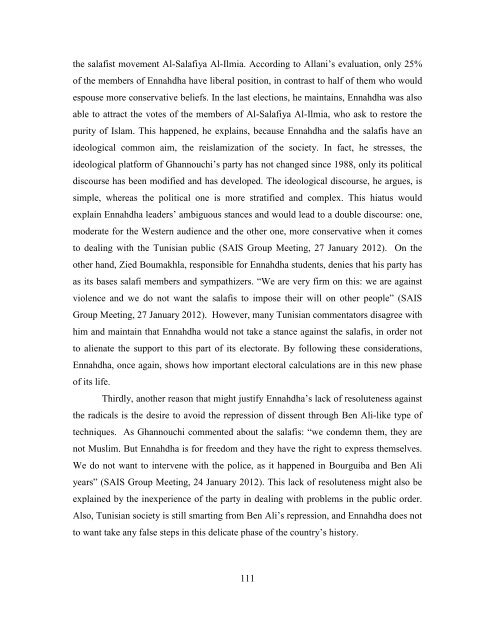Tunisia: Understanding Conflict 2012 - Johns Hopkins School of ...
Tunisia: Understanding Conflict 2012 - Johns Hopkins School of ...
Tunisia: Understanding Conflict 2012 - Johns Hopkins School of ...
Create successful ePaper yourself
Turn your PDF publications into a flip-book with our unique Google optimized e-Paper software.
the salafist movement Al-Salafiya Al-Ilmia. According to Allani’s evaluation, only 25%<br />
<strong>of</strong> the members <strong>of</strong> Ennahdha have liberal position, in contrast to half <strong>of</strong> them who would<br />
espouse more conservative beliefs. In the last elections, he maintains, Ennahdha was also<br />
able to attract the votes <strong>of</strong> the members <strong>of</strong> Al-Salafiya Al-Ilmia, who ask to restore the<br />
purity <strong>of</strong> Islam. This happened, he explains, because Ennahdha and the salafis have an<br />
ideological common aim, the reislamization <strong>of</strong> the society. In fact, he stresses, the<br />
ideological platform <strong>of</strong> Ghannouchi’s party has not changed since 1988, only its political<br />
discourse has been modified and has developed. The ideological discourse, he argues, is<br />
simple, whereas the political one is more stratified and complex. This hiatus would<br />
explain Ennahdha leaders’ ambiguous stances and would lead to a double discourse: one,<br />
moderate for the Western audience and the other one, more conservative when it comes<br />
to dealing with the <strong>Tunisia</strong>n public (SAIS Group Meeting, 27 January <strong>2012</strong>). On the<br />
other hand, Zied Boumakhla, responsible for Ennahdha students, denies that his party has<br />
as its bases salafi members and sympathizers. “We are very firm on this: we are against<br />
violence and we do not want the salafis to impose their will on other people” (SAIS<br />
Group Meeting, 27 January <strong>2012</strong>). However, many <strong>Tunisia</strong>n commentators disagree with<br />
him and maintain that Ennahdha would not take a stance against the salafis, in order not<br />
to alienate the support to this part <strong>of</strong> its electorate. By following these considerations,<br />
Ennahdha, once again, shows how important electoral calculations are in this new phase<br />
<strong>of</strong> its life.<br />
Thirdly, another reason that might justify Ennahdha’s lack <strong>of</strong> resoluteness against<br />
the radicals is the desire to avoid the repression <strong>of</strong> dissent through Ben Ali-like type <strong>of</strong><br />
techniques. As Ghannouchi commented about the salafis: “we condemn them, they are<br />
not Muslim. But Ennahdha is for freedom and they have the right to express themselves.<br />
We do not want to intervene with the police, as it happened in Bourguiba and Ben Ali<br />
years” (SAIS Group Meeting, 24 January <strong>2012</strong>). This lack <strong>of</strong> resoluteness might also be<br />
explained by the inexperience <strong>of</strong> the party in dealing with problems in the public order.<br />
Also, <strong>Tunisia</strong>n society is still smarting from Ben Ali’s repression, and Ennahdha does not<br />
to want take any false steps in this delicate phase <strong>of</strong> the country’s history.<br />
111
















